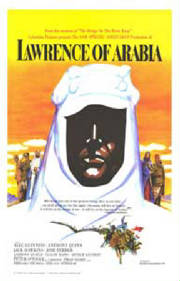|
editing: The process of selecting, assembling, arrainging, triming, structuring, and joining
together many takes of footage into a complete film.
ellipsis: The shortening of plot duration achieved by omitting intervals of story duration.

epic: A film usually made on a large scale budget that often portrays a specific historic significance.
Examples include 1962's "Lawrence of Arabia" (pictured), "The Bridge on the River Kwai" (1957), and "Patton" (1970).
epilogue: A short, concluding scene in a film in which characters reflect on preceding events.
epiphany: A moment of sudden spiritual enlightenment or insight for the protagonist of a film.
episode: A segment or part of an anthology film or serial.
episodic: A film comprised of a series of loosely related segments or episodes involving the same
characters.
establishing shot: Usually a long or wide shot at the beginning of a scene that is intended to
show things to the audience from a distance; usually followed by more detailed shots of characters or other figures closer
up.
experimental film: Usually a low budget, independent film not intended toward making a profit
that often challenges conventional filmmaking with camera techniques, imagery, sound, editing, etc.
exploitation film: Sensationalized, campy B-films aimed at a particular audience and designed
to succeed profitably; often films with extremely sexual or violent scenes. Example: "Porky's" (1982).
exposition: Conveyance of important background information for the events of a story. Sets up
a film's story.
expressionism: Distortion of reality through lighting, editing, and costumes that reflects the
inner feelings of the characters or the filmmaker.
exterior: Represents an outdoor scene.
extras: A person who appears in a movie in a non-specified/unnoticed role, such as in a background.
eyeline match: Cut between two shots that creates the illusion of the character looking at an
object.
|